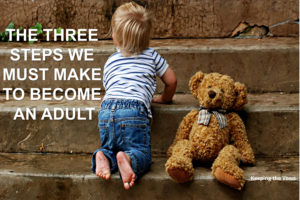The Three Steps We Must Make to Become an Adult

Let’s start with this fundamental understanding: to be married, one needs to be an adult. I can’t imagine anyone wanting to get married to a person who is childish. This may sound like a no brainer, but some fundamentals do get missed. If a child has been under the care of a parent all their life, it is quite possible that they don’t see themselves as an adult. Being an adult isn’t just in reference to their age. I’ve counseled forty and fifty-year-old men who aren’t yet sure if they are an adult. They may be the age of an adult, but they lack the independence and confidence to be an adult. I’m talking about people who continue to make childish choices or just follow like a puppy. They aren’t confident of themselves and they make decisions without considering the consequences of their decisions.
I once read about an African tribe that has a process to establish if a young male is a man or not. They crowd a bunch of wild cattle into a box canyon and then as the village watches, a boy steps from a rock onto the backs of the cattle and makes his way across the herd to the other side. If he doesn’t fall, get badly injured, or killed and reaches the other side – completing his mission – the whole village acknowledges his accomplishment. As of that moment, they all know that he is now considered a man and a warrior. They have a celebration and everyone acknowledges this transformation from boy to man. It is an important part of their culture. As of that day, the man’s responsibilities are changed and the expectations of the villagers for him are changed. His life is now different and he now sees himself as an adult. It’s amazing what we can learn from other cultures if we just look.
I found this cultural ritual interesting in that I’ve had a lot of counseling sessions over the years helping men in their twenties, thirties, forties and even fifties understand that they are now a man. Kim and I talked this over and we decided to start a family ritual. When our children were just out of high school, we had our own initiation to usher them into adulthood. Since we don’t have a box canyon or own a herd of wild cattle, we agreed that I would take each of the boys for a trip and Kim would take Hannah. We decided we would do this with a travel adventure and we let the kids choose what their destination would be. Kim and I were intentional to let our child know that we were seeing them differently at this age.
We had brought them into the world; loved them; cared for their needs; taught and coached them; and brought correction into their lives. We then told them that we were beginning to see them as adults. Our relationship was changing and would never be the same. We would always love them and respect them, but they were at an age where their decisions will be their own. Our coaching would need to relax. We told them that we would always be there if they needed our input, but there was a shift about to happen in our relationship. We said that we saw them as adults and from here on out, the decisions they made would be even more life-changing. They would make their decisions and then their decisions would make them.
Ben and I took a two week trip on our motorcycles from our home in Indiana to Colorado. Hannah, her grandma, and Kim took a trip to Belize. Silas – the one who I’ve always known would be a world traveler – went to India with me for two weeks.
Kim and I believe these trips were very beneficial in marking a time and place where we celebrated our kids becoming adults. It allowed them to make the transition into adulthood not only with our approval, but also with an understanding that they were now seen as responsible in our eyes.
In your marriage, you must now be an adult – you are not a teenager at home anymore. Yes, you can call mom and dad and ask them about the extra charge on your car insurance and what it means, but you are now an adult and need to think and act like one.
The Three Steps to Becoming an Adult:
Dependence, Independence and Interdependence
Here’s a fundamental of marriage that many people don’t think about. I teach that if couples don’t grasp the following fundamentals, they will be no more than college roommates. Life consists of a series of decisions. In the beginning, during our period of dependence, most of those decisions are made for us by the parenting person(s) responsible for our growth and development. Later, we attempt to make our own decisions independent of these persons. However, their influence is so strong that most of our personal decisions reflect the impact they had on our lives. In our mature stage of development, we move into decision making that is a combination of dependence and independence termed interdependence. Let’s take a look at these three stages of life and how they impact a marriage.
First, we start our lives being dependent. Humans are arguably the most dependent mammals on the planet. I grew up on a farm and I know that a baby pig or calf has to stand up, struggle to break its umbilical cord, get to its mother and drink milk – all within about an hour or so of being born, or they may not live. Obviously, humans can’t do this. It takes us about a year to learn to walk. Also, decision-making skills aren’t grasped and will be improving for years. It has been said that good decision-making skills aren’t in place till about age twenty-two to twenty-five.
Second, we transition to become independent. During our adolescent years, we feel the need to become independent of our parents. One might say that there is a natural progression toward independence. It’s interesting to watch our three-year-old grandson Isaiah be independent one moment and crying and very dependent the next. In the teenage years, we really strive for independence. This is good because we don’t ideally want to bottle feed and diaper our 19-year-old. I’ve always thought that a teen and their parents both want independence for the child – just different paths for this independence. When our son was in his mid-teens, he really wanted a tattoo. Knowing that most people don’t make good adult decisions till around age twenty-two to twenty-five, I suggested that he wait and when he’s an adult if he wants one that will be his decision. He waited and today he’s tattooless and about once a year he thanks me for my advice. You see, I wanted independence for my son, I was just looking at it another way. Hey, that’s a whole different book.
Small rant here: It’s interesting that many children want to become independent of their parents’ authority but want to be dependent on them financially. The parents who oblige this end up crippling their children by doing so, spending their retirement money on these dependent kids and/or running a charity Airbnb for them. Because Kim and I love them and want to help them we told our kids that our front door is a one-way door when they move out. Don’t get me wrong, if their home burns and they need a place to stay, we are there for them. We just love them enough that we don’t want to enable them to not flourish on their own. There comes a time when the bird urges their young out of the nest to fly on their own. Is it any more natural for an adult child to continue living at home than for a bird of age to remain in the nest? Moving out helps them to cement their independence. Our son Ben is thirty-five and never married, but has lived in his own home since his early twenties.
We once had a couple getting premarital counseling and she was concerned that he couldn’t afford to, but still supports his adult children. To add to the dysfunction, her fiance wouldn’t let her see any of his finances. When I questioned him on this, he stood up and yelled at me. He refused to come back for counseling and she married him anyway. I was attempting to show him that he was hurting rather than helping his children.
So, we have started life dependent and moved on to be independent. Now when we get married, we have to make one more transition. My friend Joe got married and a year later he was divorced. I asked what happened. He said she felt like she lost her independence. As a counselor, I was thinking, “Well duh! Of course, she did!” She wasn’t aware of the third transition. The third transition is one of the most important adjustments we will make in marriage and it is a deal-breaker.
The third transition is interdependence. Interdependence in a relationship looks like this: we each bring our independent thinking, emotions, and expectations into the relationship. Now, the very things that drew us to the person we married were their differences, but if we stay independent, these differences can build a wall. Interdependence, on the other hand, builds a bridge.
Interdependence does not mean that you will cease being you. It doesn’t mean you will give up your identity as a person. Instead, it means that you will now consider your spouse as much as you do yourself. This is a learning process.
Before we got married, I loved that Kim was calm and didn’t get rattled. I, however, am a bit ADHD and a go-getter. Kim takes time to make a decision. I, however, can make important decisions pretty quickly – and Kim will acknowledge that I have a great track record at making really good decisions. Kim’s decisions will take days or months and in fact, for the most part, she would rather not make decisions at all. Most of mine will take a few seconds or minutes – it’s just an intuition I have. So, after we got married and I’d ask her where she wanted to go and eat, she would say, “I don’t care,” or be silent for 15 seconds while thinking. I would get upset and think, “How can you never care where we eat? It’s only a meal. What’s the big deal?” If I were to reduce this to something even smaller that bothered me, “Why does she need to take so long to make such a small decision?” Worse yet, I thought, “Why can’t she be more like me?”
Interdependence is realizing I don’t have all the answers and my way is not always the best way and even if I think my way is best, I can at times go Kim’s way instead. I liken interdependence as going through life leaning on each other. I picture Kim and I like that. We are walking along independently – and yet leaning on each other as we do. Let’s face it, from time to time we all need someone to lean on.
Here are some examples of what interdependence looks like. When Kim and I got married, I had a motorcycle. After starting our family we decided to sell it. I still loved motorcycles, I just suspended owning one to spend time with Kim and the kids. When the kids were about sixth grade and were old enough to ride with me, I mentioned to Kim that I would enjoy getting into motorcycling again. She said she was okay with it. A few weeks later I called her from the motorcycle shop and told her there was a cycle I liked that was on sale. I told her the price and asked if she would mind if we bought it. She said sure. When I got home, she came out to see the motorcycle and she was surprised that I hadn’t bought it. I told her even though we talked on the phone and she was okay with it, I didn’t feel we had really discussed it enough to buy it. I felt like I hadn’t respected her thoughts enough. We talked about it that night, agreed it was something we would like to do and the next day we went and bought it together. That’s interdependence.
Another example of interdependence is when I was looking to buy my first airplane. I had purchased a used airplane buyer’s guide and was looking through all the models to see which one I might like to buy. Kim came into the living room and asked which one I was interested in. I told her I was looking at a Citabria, which was an aerobatic airplane (it got its name by loosely spelling aerobatic backward). I explained it was designed to do things like loops, barrel rolls, and spins. Kim said, “Can I ask you a favor?” I answered sure, and she said: “I’d rather you don’t buy an aerobatic airplane.”
This comment was from the lady that can’t make a decision! What did I do? I said ok, turned the page and went on to look at the next plane. From that moment on I didn’t even consider an aerobatic airplane. I just trusted her discernment. Many times since I have wondered what would have happened if I had bought it. My guess is that I may not be alive today. If while doing a barrel roll I had passed out… well, it wouldn’t have ended well. My interdependence on Kim made the decision easy. I’ve always felt listening to her discernment was the right thing to do and I probably would not be here today if I hadn’t listened. That’s interdependence.
A good rule of thumb for interdependence is taking the highest standard offered and going with it. I know a man who was watching a TV program. His wife came into the room and said, “You know, I don’t think that’s a good show to watch.” He said ok and changed the channel. He said she presented a higher standard and he felt good with it. This has just become the way they handle things like that. They go with whoever has the higher standard. He said he will never watch the show again. That’s interdependence – trusting your spouse and their discernment.
Here are some examples of when interdependence is not present in a relationship.
I know a man who owns a bass boat business. From my fishing friends, I understand owning a bass boat can be a very expensive hobby. I don’t fish, but for the sake of this illustration, I checked and he has one boat for over seventy thousand dollars listed on his web page. He said you can put forty thousand dollars into buying a boat and motor and then put another forty thousand into accessories. He said a guy will come in to buy a fifty-thousand dollar boat and give him a twenty-five thousand dollar check – and twenty-five thousand dollars in cash. The reason is so his wife won’t know he spent fifty thousand dollars. She only knows about the twenty-five thousand, so she assumes that is what he spent for the boat. That’s not interdependence.
While in the middle of their multiple premarital counseling sessions, a bride-to-be happened to stop by a new car dealership with her mom. On a whim, they both purchased new cars with financing – and her fiance didn’t know about it. This isn’t a good way to start a marriage. It’s a definite a definite red flag and not at all interdependence.
Kim and I use an envelope system with our money. I have an envelope for my woodworking hobby and put a certain amount of money into it each month from our budget. If I want to put my Christmas or birthday money into that envelope, that is fine. I have that choice. But Kim and I both know where the envelope is and there are no secrets.
With the growing addiction to smart technology and easy communication with others, we have seen a growing trend of some not allowing their fiance or spouse access to their phones. A variable of this has happened in my counseling on more than one occasion. A married woman will come for counsel and explain that her spouse keeps his phone locked. One day he got into the shower and left his phone unlocked by mistake. She heard it beep and picked it up only to realize he was having an affair with another woman. It devastated her to find that he had over eight-hundred texts to the other woman.
If a couple comes in for premarital counseling and one of them doesn’t allow their fiance access to their electronic devices, we explain why they should. After my counsel, if they understand what I am saying but still refuse to give their fiance access to their electronic devices, I explain to them they need to work this out before they get married. If they can’t work it out, I wouldn’t recommend the marriage. That may sound harsh, but it really is not. Marriages are built on trust, not secrecy. More often than not, these warning signs get worse, not better after marriage.
Without trust, there is no marriage. If you are going into marriage with secrecy, get out of the engagement or postpone the marriage and get counseling. It interests me when the person with the locked phone says, “If they love me, they should just trust me.” No, that’s reverse reasoning. The correct attitude is: “I have nothing to hide and I will show my ‘one flesh’ partner that I can be trusted.” Kim’s and my phones are locked, but we know each other’s unlock codes and our face ID will unlock each other’s phones.
Interdependence with my phone looks like this. We are sitting in the family room and Kim is headed to the kitchen, so I say, “Kim, my phone is on the kitchen island. I think I heard a text come in. Could you please check to see who it is?” Stop and think about it. How does that make Kim feel? It makes her feel she’s worthy of my trust. That’s interdependence.
People who miss interdependence miss the whole point of marriage. They miss the oneness. They miss the unity. It is possible to light a unity candle at the wedding ceremony and not have unity within the marriage. As I said at the beginning of the chapter, a marriage without interdependence is like living with a college roommate. You live together, you exist together, but not with trust, a purpose, or passion. We wouldn’t want to spend a lifetime like that.
Early in a relationship, we choose how we will interact and communicate with one another. Some adjustments will come, but often maturity and effort will be needed to move beyond these thoughts and behaviors. It is good to get interdependence set in place before the marriage even begins. Interdependence is such an important thing to learn that it is defined in our first premarital counseling session and mentioned in every one after that. People who don’t transition to interdependence don’t fully transition into marriage as God intended it.
We don’t have to look very far to realize that marriage is more difficult than most people expect it to be. Leaving childish ways behind is a prerequisite for a good marriage. Hopefully, by consciously making these shifts toward being responsible you can have more harmony, satisfaction, and a happier marriage.




